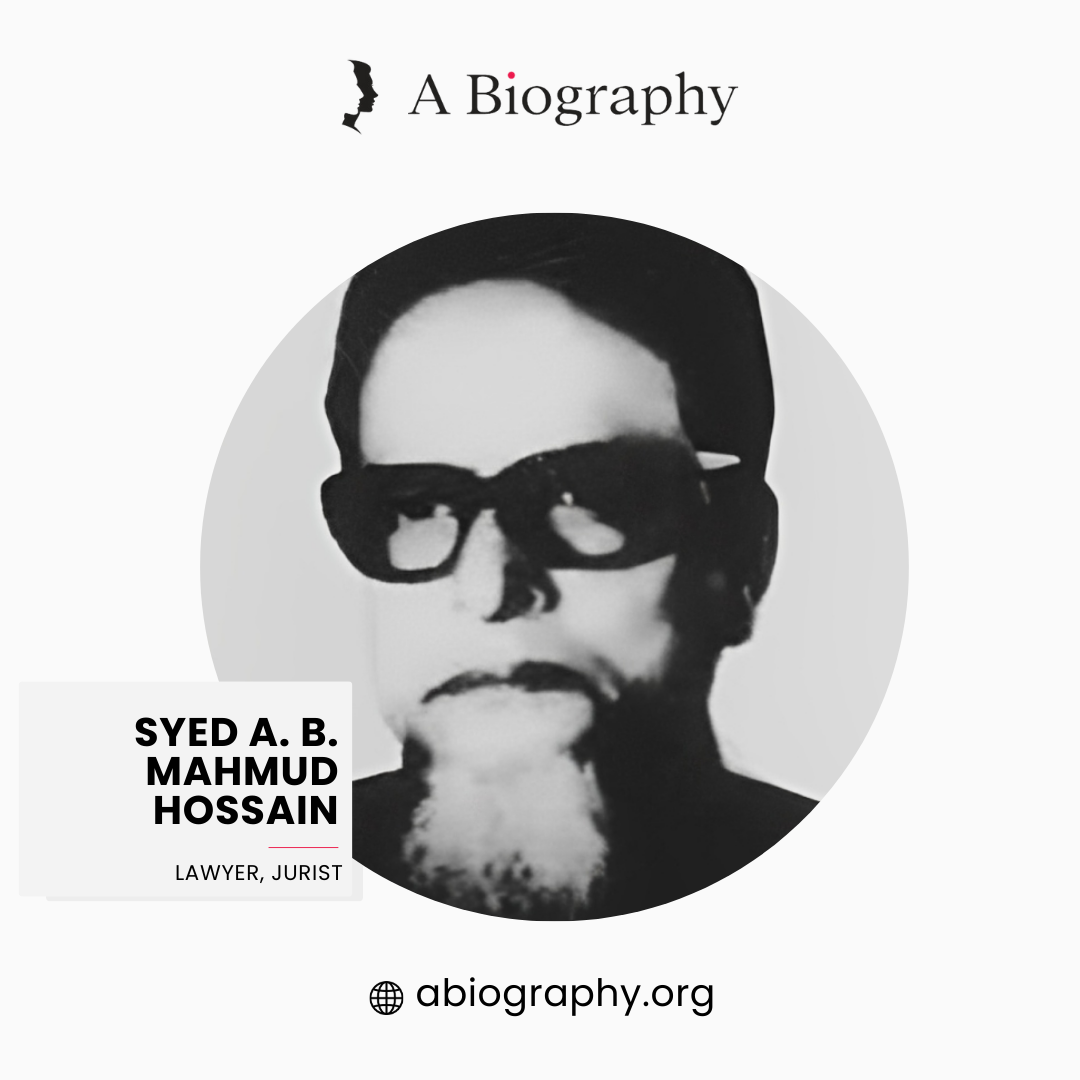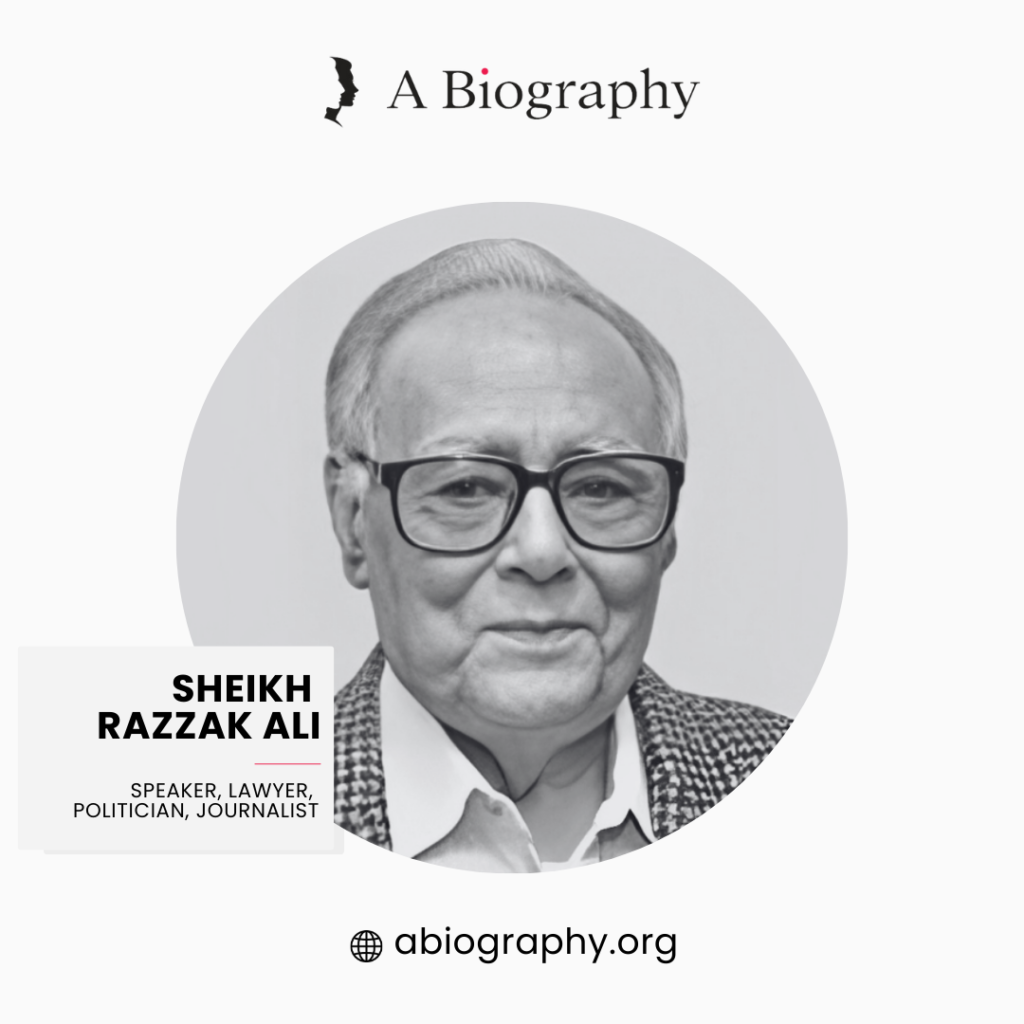BIOGRAPHY OF Syed A. B. Mahmud Hossain
Lawyer, Jurist
(1 February 1916 – 2 August 1981 )
Table of Contents
ToggleIntroduction
Syed A.B. Mahmud Hossain was a famous Bangladeshi lawyer and jurist who served as the country’s second Chief Justice from 1975 until 1978. He was an important figure in the legal profession throughout the British colonial era, the formation of Pakistan, and after Bangladesh’s independence. Husain had gained considerable esteem as the Assistant Government Pleader in the High Court of East Pakistan from 1952 to 1956. He also served as the Advocate General of East Pakistan from 1964 until his elevation to the High Court Division on January 18, 1972. He was recognized as the most prominent civil lawyer of his generation. The majority of Husain’s important decisions as Chief Justice concerned constitutional law. He was consistently emphasizing the critical need for defending the rule of law, social values, and providing justice to ordinary people.
Life of “Syed A. B. Mahmud Hossain ” at a glance
Real Name: Syed Abul Boshor Mahmud Hossain
Date of Birth: 1 February 1916
Date of Death: 2 August 1981
Place of Birth: Laskarpur, Habiganj, Bengal Presidency, British India
Place of Death: Dhaka, Bangladesh
Father’s Name: Syed Abul Mutakabbir Hasan
Mother’s Name: Saiyida Salma Khatun
Profession: Lawyer, Jurist
Education:
– Shaistaganj High School
– M.C. College, Sylhet (I.A., B.A.)
– University of Dhaka (B.L.) 1939
Experience and Ranking:
– Principal, Darul Ulum Ahsania Madrasa, Dhaka
– Assistant Government Pleader, Habiganj District Court (1943-1948)
– Advocate, Dhaka High Court (1948- )
– Attorney, Federal Court of Pakistan (1949)
– Advocate General, Federal Court of Pakistan (1950)
– Judge, East Pakistan High Court (1965)
– Judge, Supreme Court of Bangladesh (1972)
– Chief Justice of Bangladesh (1975-1978)
Religion: Islam
Native Language: Bengali
Spouse: Sufia Begum (1936)
Children:
– Son: Syed Md. Dastgir Husain (Judge, Supreme Court of Bangladesh)
– Daughter: Married Prof. M.A. Rahim Choudhury
Publication: Husain translated into Bengali and English the Diwan-e-Gausia, a collection of Persian poems attributed to Abdul Qadir Jilani.
Early Life
Syed A.B. Mahmud Husain was born into a prestigious family and showed remarkable potential as a student. Academic success and a well-educated background characterized his early years. Justice Hossain was born on February 1, 1916, in Laskarpur village, Habiganj district, British India’s then-Bengal Presidency. His father, Syed Abul Mutakabbir Hasan, was a descendant of Syed Nasiruddin, one of Hazrat Shahjalal’s 360 Auliya (saints) , and his mother, Saiyida Salma Khatun, was a Shah Jalal devotee. Husain was a Syed by birth, showing his aristocratic origins. Syed is an Arabic word that signifies “high status.” Husain acquired his early schooling at Habiganj public institutions. He was well known for being a gifted student. He received his further education at the famed M.C. College in Sylhet, where he earned IA and BA degrees with honors. He completed his formal education by receiving a B.L. degree from the University of Dhaka in 1939. Husain married Sufia Begum, the granddaughter of the eminent religious scholar Shah Ahsanullah, on December 20, 1936. Sufia’s grandpa, Shah Ahsanullah, was close to his father, Syed Abul Hasan. This familial relationship was enhanced even more by the marriage. Husain was born with a noble temperament and possessed the values of humility, compassion, and spiritualism. Following his marriage, Syed Mahmud Hossain became the honorary supervisor of Darul Ulum Ahsania Madrasa in Dhaka, which Shah Ahsanullah established.
Education and Career
As Chief Justice of Bangladesh, Syed A.B. Mahmud Husain issued seminal decisions on constitutional law issues and always emphasized upholding the rule of law, social justice, and people’s rights. At his swearing-in ceremony, he eloquently stated that the rule of law can only find its true expression in a society based on human values, affection for juniors, respect for elders, and empathy for peers. Throughout his tenure, Husain was committed to serving the public interest and was sensitive to the plight of disadvantaged segments of society. Through his discerning and well-reasoned decisions, he contributed to the establishment of justice for everyone.
Justice Husain started his education in Shaistaganj High School. After completing his early education in Habiganj, he graduated from M.C. College in Sylhet. He received a Bachelor of Laws degree from the University of Dhaka in 1939 and began practicing law in 1940. Hossain was the principal of Darul Ulum Ahsania Madrasa for a period before becoming the assistant government attorney at Habiganj District Court from 1943 to 1948. In 1948, he began practicing law before the Dhaka High Court. In 1951, he joined the Federal Court of Pakistan as an attorney, and in 1958, he joined the Supreme Court as a senior advocate. In 1965, he was appointed to the position of High Court Judge. He was appointed to the Appellate Division of the Supreme Court of Bangladesh after the country’s independence. In 1978, he resigned from his position as Bangladesh’s chief justice, which he had held since November 1975. The famous book Diwan-e-Gausia,” written in Persian about Hazrat Abdul Qadir Jilani, was translated into English and Bengali by Justice Hossain.
Justice Husain was politically active throughout his life. From 1943 to 1948, he served as the Secretary General of the Habiganj Muslim League. He was an Assam Provincial Muslim League councilor. He served as a Pakistan Muslim League councilor from 1947 to 1955. He also played a key role in the Pakistani and Sylhet referendum movements. On April 8, 1948, he was enrolled as the first advocate of the then-East Pakistan High Court, and he later acquired notoriety for handling revenue cases. On September 14, 1949, he was appointed as an Attorney of the Federal Court, and beginning on September 14, 1950, he served as the Advocate General. In 1949, he was elected to the Pakistani Constituent Assembly for the first time. From this position until 1954, he staunchly supported the people’s demands. Concerning Islamic issues and the Language Movement for Bengali, he was fearless. In 1965, he was appointed as a judge of the High Court, and on January 18, 1972, he swore in as a judge of the Bangladesh High Court. He was appointed to the Appellate Division on August 16, 1972.
Justice Hossain was an exceptionally modest, sociable, unpretentious, religious, and uncomplicated person. During his lifetime, he served as Chairman of the Mymensingh Agricultural University Commission, member of the Habiganj Local Board, syndicate member of Dhaka University, member of the Pakistan Tea Board, advisor to the East Bengal Railway, director of the Pakistan Refugee Rehabilitation Corporation, member of the Pakistan Constituent Assembly, member of the Commonwealth Parliamentary Association, member of the Inter-Parliamentary Union, President of Anjuman Mufidul Islam, and founding member of the Central Law College.
Personal Life
Justice Husain was born into a well-known Syed family in Habiganj, demonstrating his aristocratic background. His father traced his ancestry back to the 13th-century Turkish commander Syed Nasiruddin. Husain has aristocratic ancestors and a noble temperament. His profound spirituality, humility, and adaptability left an unforgettable imprint on everyone who knew him. In his personal life, Justice Hossain was a humble, religious-minded guy who was modest, affable, and unassuming. Sufi theology drew him in because of his great religious conviction. He raised his children to be intellectual and religious, just as he was devout and God-fearing. He could communicate and write in English, Urdu, Arabic, and Persian. He married Sufia Begum, Shah Ahsanullah’s granddaughter. They had a daughter and a son, Syed Md. Dastgir Husain, who became a Supreme Court Judge. He was the Bengali translator of the classic Sufi book Diwan-e-Gausia.
Legacy
Syed A.B. Mahmud Hossain was an experienced judge who led by example. He made a lot of important decisions and told lawyers in East Pakistan and Bangladesh how to do their respective duties. As Chief Justice, he made sure that the law and human principles were maintained. In the case, Bangladesh Small Industries Corporation vs. Mahbub Hossain Chowdhury, one of Husain’s most important decisions was that workers of statutory bodies cannot be thought of as office servants, and the relationship between them and the governing body cannot be compared to that of master and servant. But because their terms of service are set by law, they can’t be discharged without a chance to be recognized. Justice Hossain always did his best to protect everyone’s rights. As Chief Justice, he emphasized how important it was to improve the rule of law and set up a legal aid system because Bangladesh is so poor. He knew that lawyers were important to getting justice done and thought that the success of the judicial system counted on their dedication.
Conclusion
In summary, Syed A.B. Mahmud Hossain was one of the most prominent legal figures in Bangladesh. He had a long and distinguished career during a transformative period in history. His legacy as an able judge and administrator continues to inspire future generations.


